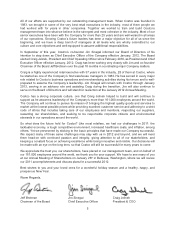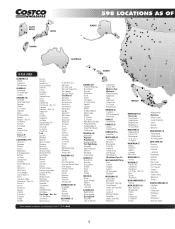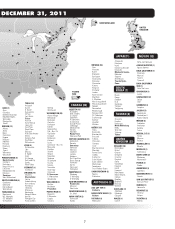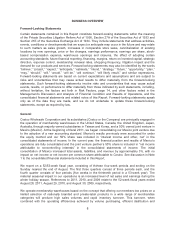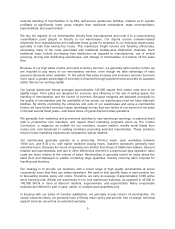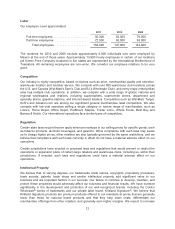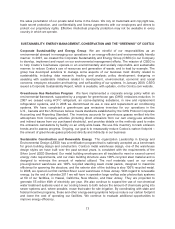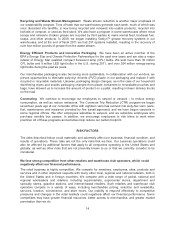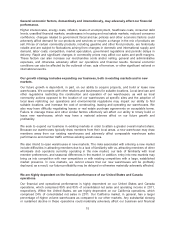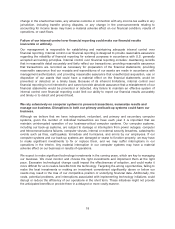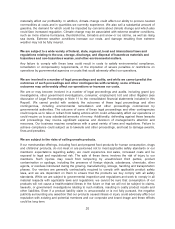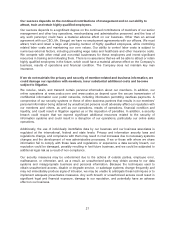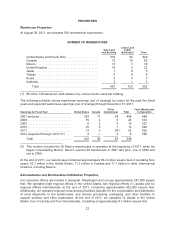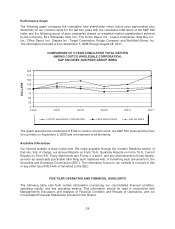Costco 2011 Annual Report Download - page 17
Download and view the complete annual report
Please find page 17 of the 2011 Costco annual report below. You can navigate through the pages in the report by either clicking on the pages listed below, or by using the keyword search tool below to find specific information within the annual report.General economic factors, domestically and internationally, may adversely affect our financial
performance.
Higher interest rates, energy costs, inflation, levels of unemployment, healthcare costs, consumer debt
levels, unsettled financial markets, weaknesses in housing and real estate markets, reduced consumer
confidence, changes related to government fiscal and tax policies and other economic factors could
adversely affect demand for our products and services or require a change in the mix of products we
sell. Prices of certain commodity products, including gasoline and other food products, are historically
volatile and are subject to fluctuations arising from changes in domestic and international supply and
demand, labor costs, competition, market speculation, government regulations and periodic delays in
delivery. Rapid and significant changes in commodity prices may affect our sales and profit margins.
These factors can also increase our merchandise costs and/or selling, general and administrative
expenses, and otherwise adversely affect our operations and financial results. General economic
conditions can also be affected by the outbreak of war, acts of terrorism, or other significant national or
international events.
Our growth strategy includes expanding our business, both in existing markets and in new
markets.
Our future growth is dependent, in part, on our ability to acquire property, and build or lease new
warehouses. We compete with other retailers and businesses for suitable locations. Local land use and
other regulations restricting the construction and operation of our warehouses, as well as local
community actions opposed to the location of our warehouses at specific sites and the adoption of
local laws restricting our operations and environmental regulations may impact our ability to find
suitable locations, and increase the cost of constructing, leasing and operating our warehouses. We
also may have difficulty negotiating leases or real estate purchase agreements on acceptable terms.
Failure to manage these and other similar factors effectively will affect our ability to timely build or
lease new warehouses, which may have a material adverse affect on our future growth and
profitability.
We seek to expand our business in existing markets in order to attain a greater overall market share.
Because our warehouses typically draw members from their local areas, a new warehouse may draw
members away from our existing warehouses and adversely affect comparable warehouse sales
performance and member traffic at those existing warehouses.
We also intend to open warehouses in new markets. The risks associated with entering a new market
include difficulties in attracting members due to a lack of familiarity with us, attracting members of other
wholesale club operators currently operating in the new market, our lack of familiarity with local
member preferences, and seasonal differences in the market. In addition, entry into new markets may
bring us into competition with new competitors or with existing competitors with a large, established
market presence. In new markets, we cannot ensure that our new warehouses will be profitably
deployed; as a result, our future profitability may be delayed or otherwise materially adversely affected.
We are highly dependent on the financial performance of our United States and Canada
operations.
Our financial and operational performance is highly dependent on our United States and Canada
operations, which comprised 89% and 83% of consolidated net sales and operating income in 2011,
respectively. Within the United States, we are highly dependent on our California operations, which
comprised 24% of consolidated net sales in 2011. Our California market, in general, has a larger
percentage of higher volume warehouses as compared to our other markets. Any substantial slowing
or sustained decline in these operations could materially adversely affect our business and financial
15


